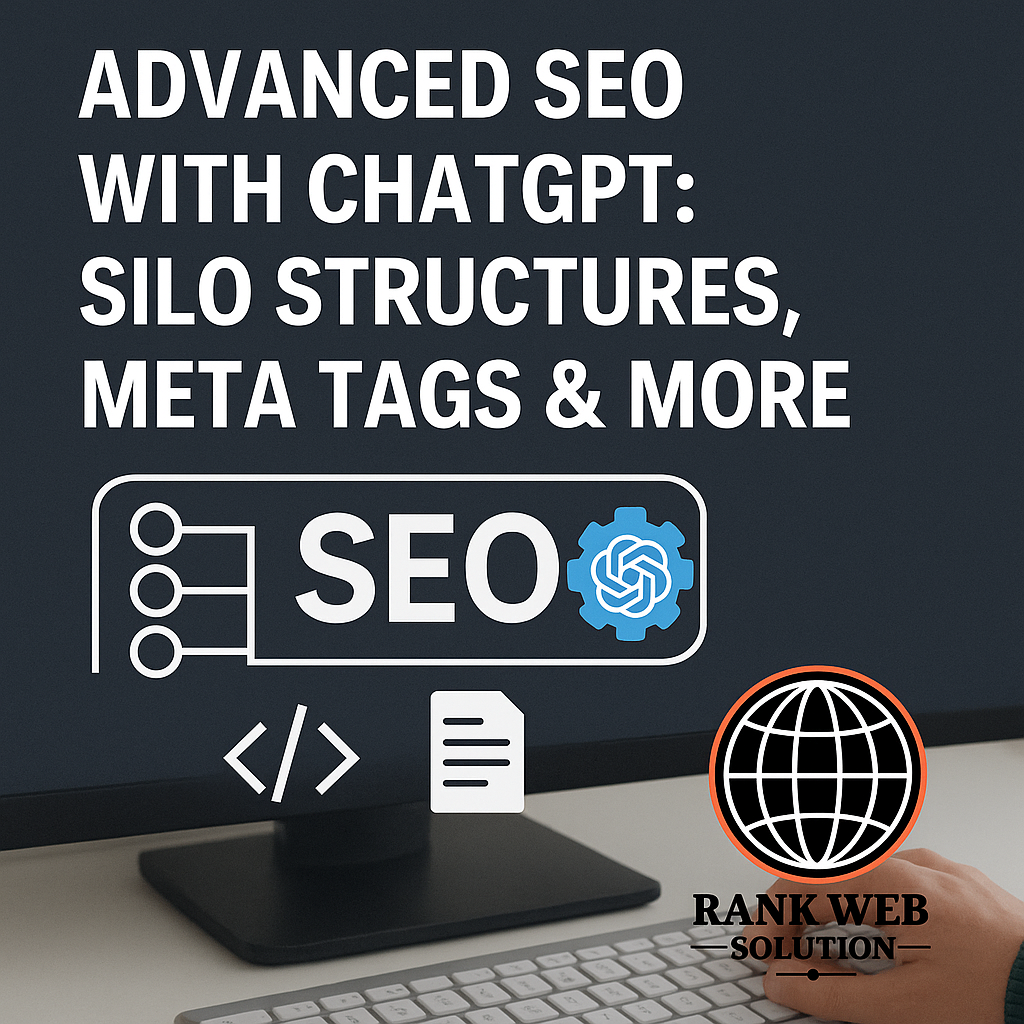As SEO continues to evolve with AI technologies at the forefront, marketers and website owners are leveraging tools like ChatGPT to streamline and scale their strategies. While most users focus on content generation or keyword research, there’s far more potential beneath the surface. From building silo structures to crafting effective meta tags, ChatGPT can assist with advanced SEO tasks that traditionally require time and technical skill.
At Rank Web Solution, we’ve explored how ChatGPT can be used not just as a content assistant, but as a strategic partner in technical and on-page SEO. In this blog, we’ll dive into how you can apply ChatGPT to elevate your site structure, metadata, and optimization efforts.
Understanding Silo Structures and Why They Matter
A silo structure is an SEO site architecture strategy that groups related content into specific categories or “silos.” Each silo supports a central theme, helping search engines understand content hierarchy and topic relevance.
Benefits of Silo Structures:
- Enhances internal linking and crawlability
- Boosts topical authority
- Reduces content duplication and cannibalization
- Improves user navigation and site experience
How ChatGPT Helps Build Silo Structures
Creating a logical and effective silo structure starts with organizing your content strategy around primary topics and subtopics. Here’s how ChatGPT can assist:
- Topic Mapping
You can prompt ChatGPT with:
“Generate a content silo structure for a website about fitness training, including pillar and supporting topics.”
It will return suggestions like:
- Pillar: Strength Training
- Subtopics: Dumbbell Workouts, Bodyweight Exercises, Gym Routines
- Pillar: Nutrition
- Subtopics: Meal Planning, Protein Intake, Supplements
This helps SEO teams visualize content clusters and ensure each post contributes to a broader theme.
- Internal Linking Suggestions
ChatGPT can also recommend logical internal links between posts. For example:
“Suggest internal linking strategies for a silo around SEO basics.”
It might return:
- Link “What Is SEO?” to “How Search Engines Work”
- Link “On-Page SEO Techniques” to “Optimizing Meta Tags”
You can then refine these links manually or with an SEO plugin to maintain control.
Crafting Effective Meta Tags with ChatGPT
Meta tags—especially title tags and meta descriptions—still play a crucial role in improving click-through rates and helping search engines understand page context.
Here’s how ChatGPT can help:
- SEO-Friendly Title Tags
Prompt:
“Write an SEO title tag for a blog about local SEO strategies for dentists.”
Output:
“Top Local SEO Strategies for Dentists to Attract More Patients”
- Compelling Meta Descriptions
Prompt:
“Write a meta description under 160 characters for the same blog.”
Output:
“Learn how dentists can boost visibility and attract local patients with proven local SEO tactics.”
You can generate multiple variations quickly and then tweak them to meet brand tone or keyword focus.
Additional Advanced SEO Tasks ChatGPT Can Assist With
While ChatGPT isn’t a replacement for advanced SEO tools, it can still help with a variety of tasks:
Schema Markup Suggestions
Generate simple JSON-LD schemas for blog posts, FAQs, and reviews.
Prompt:
“Write schema markup for a blog post titled ‘Top 10 SEO Tools in 2025.’”
Content Briefs for SEO Writers
ChatGPT can help you draft outlines and briefs based on SERP analysis, saving time during content planning.
Alt Text for Images
Prompt:
“Write 5 descriptive alt text examples for images on a pet grooming website.”
These types of micro-optimizations support accessibility and enhance on-page SEO.
Important Considerations
While ChatGPT is powerful, human oversight remains essential. Here’s why:
- Context limitations: AI may not fully understand brand tone or industry nuance.
- Over-reliance risk: Blindly copying AI outputs may lead to generic content.
- No real-time data: ChatGPT doesn’t pull live keyword volume or ranking data like SEO tools do.
At Rank Web Solution, we recommend using ChatGPT as a supplement to your strategy—not a substitute. Combine its output with professional SEO audits, real keyword data, and manual review to maintain accuracy and effectiveness.
Add Your Heading Text Here
If you’re already exploring AI for SEO, ChatGPT is a great companion to more data-driven platforms like SurferSEO, Ahrefs, and SEMrush. These platforms offer live data, while ChatGPT can help you brainstorm and implement ideas quickly. Together, they create a comprehensive AI-enhanced SEO stack.
This approach is especially powerful when dealing with niche strategies such as SEO in a B2B environment, where content personalization and technical depth often determine success.
Final Thoughts
As Google and other search engines prioritize helpful, relevant content and structured site architecture, using ChatGPT for advanced SEO becomes a smart move for modern marketers. Whether you’re building silo structures, writing optimized meta tags, or developing strategic internal linking plans, ChatGPT can save time and spark ideas.
At Rank Web Solution, we continue to test, learn, and integrate AI tools into our SEO services to deliver faster, smarter results. Embrace the power of AI—not just to write, but to think strategically—and you’ll stay ahead of the curve in today’s competitive digital landscape.




